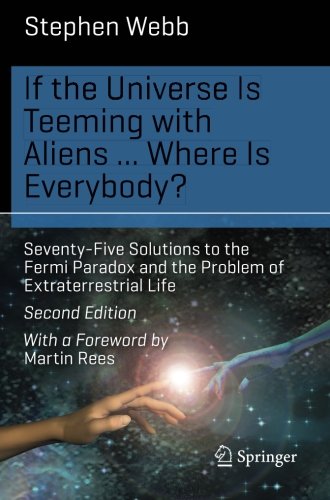

Most ebook files are in PDF format, so you can easily read them using various software such as Foxit Reader or directly on the Google Chrome browser.
Some ebook files are released by publishers in other formats such as .awz, .mobi, .epub, .fb2, etc. You may need to install specific software to read these formats on mobile/PC, such as Calibre.
Please read the tutorial at this link: https://ebookbell.com/faq
We offer FREE conversion to the popular formats you request; however, this may take some time. Therefore, right after payment, please email us, and we will try to provide the service as quickly as possible.
For some exceptional file formats or broken links (if any), please refrain from opening any disputes. Instead, email us first, and we will try to assist within a maximum of 6 hours.
EbookBell Team

0.0
0 reviewsGiven the fact that there are perhaps 400 billion stars in our Galaxy alone, and perhaps 400 billion galaxies in the Universe, it stands to reason that somewhere out there, in the 14-billion-year-old cosmos, there is or once was a civilization at least as advanced as our own. The sheer enormity of the numbers almost demands that we accept the truth of this hypothesis. Why, then, have we encountered no evidence, no messages, no artifacts of these extraterrestrials?
In this second, significantly revised and expanded edition of his widely popular book, Webb discusses in detail the (for now!) 75 most cogent and intriguing solutions to Fermi's famous paradox: If the numbers strongly point to the existence of extraterrestrial civilizations, why have we found no evidence of them?
Reviews from the first edition:
"Amidst the plethora of books that treat the possibility of extraterrestrial intelligence, this one by Webb … is outstanding. … Each solution is presented in a very logical, interesting, thorough manner with accompanying explanations and notes that the intelligent layperson can understand. Webb digs into the issues … by considering a very broad set of in-depth solutions that he addresses through an interesting and challenging mode of presentation that stretches the mind. … An excellent book for anyone who has ever asked ‘Are we alone?’." (W. E. Howard III, Choice, March, 2003)
"Fifty ideas are presented … that reveal a clearly reasoned examination of what is known as ‘The Fermi Paradox’. … For anyone who enjoys a good detective story, or using their thinking faculties and stretching the imagination to the limits … ‘Where is everybody’ will be enormously informative and entertaining. … Read this book, and whatever your views are about life elsewhere in the Universe, your appreciation for how special life is here on Earth will be enhanced! A worthy addition to any personal library." (Philip Bridle, BBC Radio, March, 2003)
Since gaining a BSc in physics from the University of Bristol and a PhD in theoretical physics from the University of Manchester, Stephen Webb has worked in a variety of universities in the UK. He is a regular contributor to the Yearbook of Astronomy series and has published an undergraduate textbook on distance determination in astronomy and cosmology as well as several popular science books. His interest in the Fermi paradox combines lifelong interests in both science and science fiction.